- Clone
- 4B12/Synuclein (See other available formats)
- Regulatory Status
- RUO
- Other Names
- NACP, PARK1, PARK4, PD1, Synuclein alpha-140, non-A4 component of amyloid, alpha-synuclein, isoform NACP140, non-A beta component of AD amyloid Parkinson disease
- Isotype
- Mouse IgG1, κ
- Ave. Rating
- Submit a Review
- Product Citations
- publications

-

Western blot of HRP anti-α-Synuclein, 103-108 (clone 4B12/Synuclein). Lane 1: Molecular weight marker; Lane 2: 10 µg of human brain lysate. The blot was incubated with 1 µg/mL of the primary antibody overnight at 4°C. Enhanced chemiluminescence was used as the detection system. -

IHC staining of HRP anti-α-Synuclein, 103-108 (clone 4B12/Synuclein) on formalin-fixed paraffin-embedded normal human (left) and Parkinson’s disease (right) brain tissue. After antigen retrieval using 70% formic acid, the tissues were incubated with 2.5 µg/mL of the primary antibody at for 24 hours at 4°C. DAB was used for detection followed by hematoxylin and bluing solution counterstaining, according to the protocol provided.
| Cat # | Size | Price | Quantity Check Availability | Save | ||
|---|---|---|---|---|---|---|
| 807806 | 100 µg | 254€ | ||||
α-Synuclein is expressed principally in the nervous system, but it is also produced in other tissues, including the skin. In the brain, the protein is primarily neuronal, but it is also present in glia. Neuronal α-synuclein is concentrated in presynaptic nerve terminals, interacts with plasma membrane phospholipids, and is also present in nuclei and mitochondria. At least three isoforms of synuclein are produced through alternative splicing. The most common isoform is a 140 amino acid-long transcript. Other isoforms are a-synuclein-126, lacking residues 41-54; and α-synuclein-112, which lacks residues 103-130. α-Synuclein’s physiological role is poorly understood, but the protein has been implicated in regulating dopamine release and transport, synaptic vesicle clustering, and functioning as a SNARE-complex chaperone. α-Synuclein fibrils are major component of the intracellular Lewy bodies that are associated with Parkinson's disease, Lewy body dementia, and multiple system atrophy.
Product DetailsProduct Details
- Verified Reactivity
- Human
- Antibody Type
- Monoclonal
- Host Species
- Mouse
- Immunogen
- This antibody was developed using a purified, E. coli produced human α-synuclein.
- Formulation
- This antibody is provided in 50% glycerol in aqueous buffered solution with preservatives.
- Preparation
- The antibody was purified by affinity chromatography and conjugated with HRP under optimal conditions.
- Concentration
- 0.5 mg/ml
- Storage & Handling
- Upon receipt, the antibody solution should be stored undiluted at -20°C, and protected from prolonged exposure to light.
- Application
-
IHC-P - Quality tested
WB - Verified - Recommended Usage
-
Each lot of this antibody is quality control tested by formalin-fixed paraffin-embedded immunohistochemical staining. For immunohistochemistry, a concentration range of 1.0 - 5.0 µg/ml is suggested. For Western blotting, the suggested use of this reagent is 0.5 - 1.0 µg per ml. It is recommended that the reagent be titrated for optimal performance for each application.
- Application Notes
-
This antibody reacts with human a-synuclein. It does not react with mouse or rat a-synuclein. The epitope lies within amino acids 103-108 of a-synuclein.
Additional reported applications (for the relevant formats) include: ELISA2, Western blotting1,2,3,4,6,8, and immunoprecipitation4. - Application References
-
- Lahut S, et al. 2017. Dis Model Mech. (WB) PubMed
- Landeck N, et al. 2016. Mol Neurodegener. 11(1): 61. (ELISA, WB) PubMed
- Moussaud S, et al. 2015. Expert Opin Ther Targets. 19(5): 589. (WB) PubMed
- Helferich AM., et al. 2015. Mol Neurodegener. 10(1): 66. (IHC, IP, WB) PubMed
- Bodis‐Wollner I, et al. 2014. Ann Neurol. 75(6): 964. (IHC)
- Shen W, et al. 2014. J Neurochem. 129(5): 884. (WB)
- Fagerqvist T, et al. 2013. J Neurochem. 126(1): 131. (IHC)
- Ebrahimi-Fakhari D, et al. 2011. J Neurosci. 31(41): 14508. (WB) PubMed
- Welander H, et al. 2011. Biochem Biophys Res Commun. 412(1): 32. (IHC)
- RRID
-
AB_2721332 (BioLegend Cat. No. 807806)
Antigen Details
- Structure
- α-Synuclein’s canonical isoform is a 140 amino acid protein with an apparent molecular mass of 14 kD.
- Distribution
-
Tissue distribution: Primarily nervous system, but lower expression in other tissues.
Cellular distribution: Cytoskeleton, cytosol, lysosome, mitochondria, nucleus, plasma membrane, and extracellular. - Biology Area
- Cell Biology, Neurodegeneration, Neuroscience, Protein Misfolding and Aggregation
- Molecular Family
- α-Synuclein
- Antigen References
-
- Lee JM, et al. 2017. J Neuropathol Exp Neurol. 76(1):2.
- Kang SS, et al. 2017. Proc Natl Acad Sci. 114(5): 1183.
- Valdes P, et al. 2016. Front Neuroanat. 10:123.
- Emamzadeh FN. 2016. J Res Med Sci. 9(21):29.
- Gene ID
- 6622 View all products for this Gene ID
- UniProt
- View information about alpha-Synuclein 103-108 on UniProt.org
Related Pages & Pathways
Pages
Related FAQs
Other Formats
View All α-Synuclein 103-108 Reagents Request Custom Conjugation| Description | Clone | Applications |
|---|---|---|
| Purified anti-α-Synuclein, 103-108 | 4B12/Synuclein | IHC-P,ELISA,WB |
| HRP anti-α-Synuclein, 103-108 | 4B12/Synuclein | IHC-P,WB |
| Biotin anti-α-Synuclein, 103-108 | 4B12/Synuclein | IHC-P,ELISA Detection,WB |
Customers Also Purchased
Compare Data Across All Formats
This data display is provided for general comparisons between formats.
Your actual data may vary due to variations in samples, target cells, instruments and their settings, staining conditions, and other factors.
If you need assistance with selecting the best format contact our expert technical support team.
-
Purified anti-α-Synuclein, 103-108
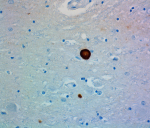
IHC staining of purified anti-α-Synuclein, 103-108 antibody ... 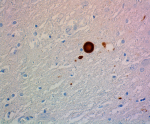
IHC staining of purified anti-α-Synuclein, 103-108 antibody ... 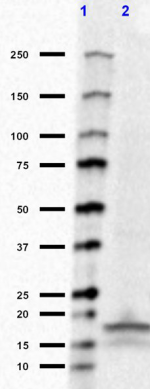
Western blot of purified anti-α-Synuclein, 103-108 antibody ... -
HRP anti-α-Synuclein, 103-108

Western blot of HRP anti-α-Synuclein, 103-108 (clone 4B12/Sy... 
IHC staining of HRP anti-α-Synuclein, 103-108 (clone 4B12/Sy... -
Biotin anti-α-Synuclein, 103-108

IHC staining of Biotin anti-α-Synuclein, 103-108 antibody (c... 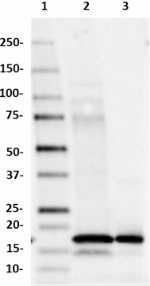
Western blot of Biotin anti-α-Synuclein, 103-108 antibody (c... 
 Login / Register
Login / Register 





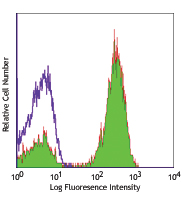

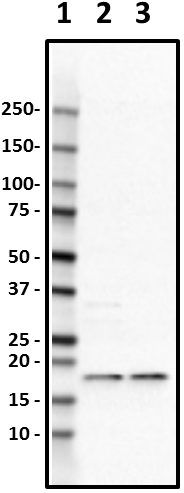



Follow Us